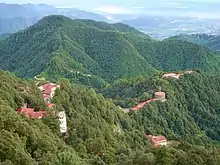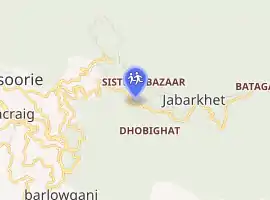Woodstock School
Woodstock School is an international coeducational residential school located in Landour, a small hill station contiguous with the town of Mussoorie, Uttarakhand, India, in the foothills of the Himalayas.
| Woodstock School | |
|---|---|
 | |
 Woodstock school campus | |
| Location | |

| |
| , 248 179 | |
| Coordinates | 30°27′14″N 78°6′3″E |
| Information | |
| Type | Independent, Residential, International |
| Motto | Palma non sine pulvere (No reward without effort) |
| Religious affiliation(s) | Christian |
| Established | 1854 |
| Principal | Dr Craig Cook [1] |
| Grades | KG-12 |
| Gender | Coeducational |
| Enrollment | 494 447 boarders · 47 day students |
| Language | English |
| Campus | On first range of Himalayas, between 2000 & 2300 metres |
| Colour(s) | Brown and gold |
| Mascot | Tiger |
| Newspaper | www.thewoodstocker.com |
| Yearbook | Whispering Pine |
| Information | tel: 91.135.263.9000 fax: 91.135.263.2885 |
| Website | www.woodstockschool.in |
.jpg.webp)
Woodstock is one of the oldest residential schools in Asia, operating today as a private nonprofit institution with Indian Christian Minority Status. Woodstock offers kindergarten through Grade 12 instruction, with a residence programme beginning in Grade 6. It is fully accredited by the Middle States Association, the first school in Asia to receive accreditation in 1960.[2] In 2019 Woodstock School was officially accredited as an International Baccalaureate (IB) World School, with full authorisation for both the IB Middle Years Programme (MYP) and Diploma Programme (DP). [3]
History
Woodstock was founded in 1854 and has been on its current campus since 1856. First managed as a girls’ school with staff provided by an English mission, there came an increasing demand from missionaries for a school in North India with an American curriculum to prepare students for American colleges and universities. By 1928, a full American coeducational programme had been introduced at Woodstock. In 1959, Woodstock was the third high school outside North America and the first school in Asia to receive US accreditation through the Middle States Association of Colleges and Secondary Schools.[4]
During the 1960s, cross-cultural courses in social studies, literature, art, and religion were introduced, and Indian classical music and dance lessons were added. Indian universities became more accepting of the Woodstock Diploma, and in 1990 the Association of Indian Universities recognized the Woodstock Diploma as being equivalent to the Indian school-leaving examination, thus allowing graduates to enter Indian universities with greater ease. A year-abroad study program was instituted to keep a North American presence in the school as the missionary population declined. First called the "Package Program," it has been part of the SAGE (Studies Abroad for Global Education) network[5] since 1992, and has been closely allied with the Friends of Woodstock and its predecessor organizations in North America.
In the 1960s and 1970s Woodstock began to rethink its composition, purpose, and philosophy as an institution. The school consciously shifted its conception from that of a missionary school to a school consisting of an international student body, staff, and curriculum, with a strong Indian cultural component. This change to a truly international school was led by Robert Alter, Principal from 1968 to 1978. With the increasing internationalization of the student body, an English as a Second Language (ESL) program was established in 1978.[6]
In recent years, Woodstock has placed a priority on its academic programming with renovations to classrooms and laboratories, the introduction of contemporary classes such as Environmental Sciences, an increase in the number of US Advanced Placement examinations offered to and taken by seniors, and the requirement for all students to take the Cambridge University IGCSE examinations in Grade 10.
In 2004, Woodstock celebrated 150 years of its journey. The Government of India issued a Woodstock School commemorative postage stamp in 2004.[7]
Alumni organizations
The Woodstock Old Students Association (WOSA) was founded in 1911 and has chapters in many countries.[8]
The alumni organization serving the North America region is a 501(c)3 entity: Friends of Woodstock School. FWS is the successor to Kodai-Woodstock International (KWI), and organizes an annual alumni reunion in North America. FWS maintains an alumni database and provides an umbrella for smaller "Curry Club" groups that convene on an ad-hoc basis.
Affiliations
- International Baccalaureate(IB)[9]
- Council of International Schools (CIS)[10]
- Global Alliance for Innovative Learning (GAIL)[11]
- Association of International Schools in India (TAISI)[12]
- Boarding Schools Association (BSA)[13]
- National Association of Independent Schools (NAIS)[14]
- Academy for International School Heads (AISH)[15]
- Headmasters' and Headmistresses' Conference (HMC)[16]
- Council for Advancement and Support of Education (CASE)[17]
- National Honor Society (NHS)[18]
Notable alumni
- Chris Anderson, publisher (founder of Future Publishing and owner, CEO and Curator of TED (1974)
- Martha (Marty) Chen (née Alter), academic, scholar and social worker (1960)[19]
- Tom Alter, actor (1968)[20]
- Stephen Alter, author (1974)
- George H. Carley, Former Chief Justice of the Supreme Court of Georgia(1956)
- Robert Griffiths, physicist (1952)
- Jonathan Mark Kenoyer, anthropologist (1970)
- Dilshad Najmuddin, Pakistani Inspector-General police officer and ambassador to the Holy See (1945)
- Ruchi Narain, film maker
- Pernia Qureshi, fashion entrepreneur, designer (2002)
- Dorothy Riddle, psychologist (1960)
- Nayantara Sahgal, writer (1943)
- Henry Scholberg, author (1939)[21]
- Robert E. Scott, law professor (1962)
- Carl E. Taylor, international health expert (1932)
- Jay Smith, american Christian evangelist, apologist and polemicist.
References
- "Woodstock School appoints Dr Craig Cook as new principal". Education World. Retrieved 26 April 2019.
- "MSA-CESS -> Member Resources -> Membership Directory". www.msa-cess.org.
- "Woodstock Is An International Baccalaureate (IB) World School". www.woodstockschool.in.
- Jones, Wilkie, McGee. Woodstock School: The First Century 1854-1954. Woodstock School Board of Directors, 1954.
- "Studies Abroad for Global Education: High School Study Abroad". Verge Magazine. Retrieved 28 October 2017.
- Hilliard, Ruth. Woodstock History Volume II. Woodstock School Board of Directors, 1983.
- "Postage Stamps 2004". Postage Stamps of India. Department of Posts, Ministry of Communications, Government of India. Retrieved 10 August 2016.
- "Woodstock School: Our Purpose". newsarchive.woodstockschool.in.
- "International Education- International Baccalaureate Organisation". www.ibo.org.
- "Council of International Schools - International Education Organisation". www.cois.org.
- "THE GLOBAL ALLIANCE FOR INNOVATIVE LEARNING (GAIL)". 28 July 2015.
- "TAISI::Home Page". www.taisindia.org.
- "The Boarding Schools' Association (BSA)". boarding.org.uk.
- "Home". NAIS. Retrieved 18 July 2018.
- "AISH# : External Home Page". www.academyish.org.
- "The Headmasters' and Headmistresses' Conference (HMC)". HMC.
- "CASE - Home". www.case.org.
- "NHS". www.nhs.us.
- "Marty Alter Chen-Alumni-Woodstock School, India". newsarchive.woodstockschool.in.
- "Woodstock School India, Boarding School, Residential International Christian Education". newsarchive.woodstockschool.in.
- Tucker, Todd (2007). The Great Starvation Experiment: Ancel Keys and the Men Who Starved for Science. University of Minnesota Press. pp. 53–57. ISBN 9780816651610.
External links
- Woodstock School website
- The Woodstocker: online student newspaper
- Best Boarding Schools website